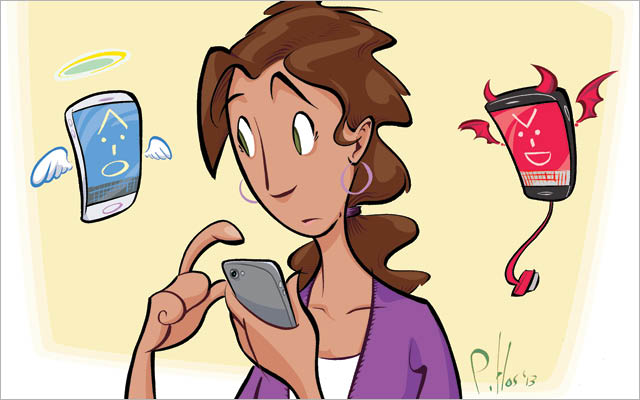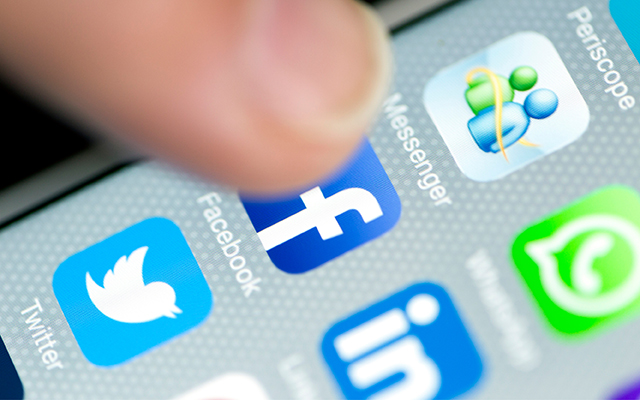Last Thanksgiving, a Facebook update by Claire Anderson turned into a family dustup. Anderson and her husband had just returned home from a relaxed pre-holiday dinner they enjoy with friends each year, and she wrote a quick affectionate post: “Had a good time at the Friends Thanksgiving. Now on to the more stressful family one. Love you guys!”
The “stressful family,” however, was also on Facebook. Anderson’s in-laws were less than thrilled. “Hmmm. Interesting comment for public consumption,” her mother-in-law responded. “Wow . . . ? Sorry.” was all her father-in-law wrote.
Most of us have had similar forehead-slapping moments. Given the speed and convenience of digital communication, it’s easy to dash off a comment and forget that our electronic community is almost always bigger (and more attentive) than we realize. Anderson was able to make amends to her family, but she felt terrible. “I should’ve known better,” she says.
It’s a lot of work to undo a blunder once it zips off into the ether, whether by Facebook, text, or Twitter. The easiest way to handle digital disasters is to guard against them before they happen. Here are some guidelines from etiquette experts that will help you build and maintain good techno-manners.
Texting Tact
Phone texting is the ideal tool for making plans on the fly or letting friends know you’re
running late. Still, the slapdash nature of texting can invite trouble. Below are some of the most common offenses — and how to avoid them.
Texting While Talking: If you find yourself half-listening during a face-to-face conversation while you peek or peck at your phone, get into the habit of stashing it away when interacting with someone.
Too Much Information: Because you never know where the receiver will be when she opens a text (on a date? between meetings?), keep messages short and sweet. Avoid complex or confrontational discussions, advises Lizzie Post, great-great-granddaughter of etiquette maven Emily Post and coauthor of Emily Post’s Etiquette, 18th Edition (William Morrow, 2011). “When things start to get heated or confused,” she says, “stop the text conversation and get that someone over the phone or in person.”
Last-Minute Cancellations: One of the great temptations of texting is to use it to cancel plans at the last minute, which not only disrespects people’s time, but is more than a little passive-aggressive. If you vow to cancel only verbally, you might think twice before agreeing to join your brother for that four-hour Iranian film that starts at 10 p.m.
Impatience: Assume that your friends and loved ones lead interesting lives, and they might not get your text immediately. Be patient. If a matter is urgent, call. If you receive a text that warrants a quick reply and you’re busy, Post recommends sending a placeholder message, saying you’ll reply or call soon.
Twitter Civility
Having a Twitter feed and following others is an easy way to stay current on professional news, share noteworthy items, promote causes, and forge connections with people you want to know. Still, Twitter reaches millions of people in real time, and as some memorable celebrity blunders attest, any form of instant public announcement comes with some risks.
Treating Twitter Like a Telephone: Many people use Twitter for professional purposes. Before you tweet to someone, consider his audience. Save anything that isn’t meant for public consumption for a direct message or email.
Self-Indulgence: The brevity of Twitter can tempt one to broadcast the minutest details, but you no doubt have more interesting things to share than what you ate for breakfast. If a friend has an upcoming art opening, tweet the details and encourage others to attend. And when someone uses Twitter to promote your events, be sure to tweet your thanks.
Disrespecting Privacy: “Live-tweeting” is entirely appropriate during a heated NBA playoff game, especially if you’re a sports reporter. But beware of broadcasting real-time details of more personal gatherings. “It’s one thing when you’re at a business event and part of your job is to keep people informed about what’s going on,” Post says. “It’s different when you’re at someone’s wedding and you tweet about it.”
Fakery: Don’t try to be dazzling, advises Christopher Johnson, author of Microstyle: The Art of Writing Little (W. W. Norton & Company, 2012). “I think the best users of Twitter always keep in touch with their natural conversational voices,” he says. “If you imagine you’re speaking to people you like, you’ll avoid being too immodest, keep your messages simple and colorful, and sometimes even be witty.”
Facebook Rulebook
Sixty-seven percent of American adult Internet users now have Facebook accounts. While the benefits are numerous — staying connected with distant family, reconnecting with old friends, easy information exchanges about projects and passions — so are the opportunities for misfires.
Oversharing: How much to share of oneself online is a matter of personal taste. Some people are more comfortable with digital interactions than eye-to-eye conversations, and Facebook can be a great way to feel the support of an entire community. But unless you’re prepared to defend any and everything you post, however personal, use privacy settings to create lists of people you’re confident have your best interests at heart.
Public Disputes: It’s unlikely that every person you’re connected to shares your beliefs, and Facebook rants are not uncommon — but don’t use online forums to pursue a conflict. Being confronted digitally gives you the advantage of having time to compose yourself and redirect the interaction back to the high road. You can also respond to negative feedback on Facebook with something like, “Good point, so-and-so. We may disagree, but I appreciate you speaking up.”
Inadvertent Offense: Hurt feelings happen on Facebook. You post a photo of a friend and her new sweetheart, forgetting her ex is also on your list. Or, like Anderson, you post a quick update that inadvertently offends someone you care about. The best way to handle this built-in potential is to make maximum use of privacy settings, creating lists for who can see which posts and who can’t. This process might be tedious, but it avoids a lot of misunderstanding. Finally, mistakes happen. Try not to take your “friends’” posts personally.
Too Much Me Time: Don’t fall prey to “vague-booking,” the phenomenon of posting general complaints like “Ugh, I’ve just had it!” These will come across as bids for attention, not conversation. Keep your posts simple and straightforward, and “like” the posts of others and congratulate them on successes whenever you can. Facebook is a great opportunity to make yourself — and others — look good.
After all, this is social media. You really need to remember only one thing: Be social.




This Post Has 0 Comments